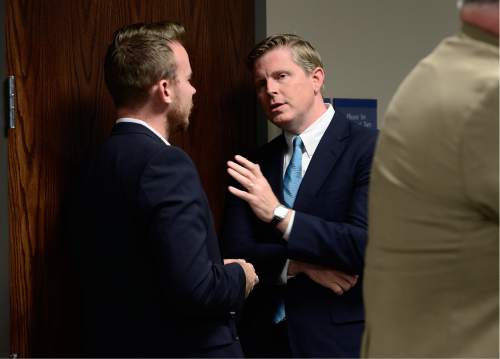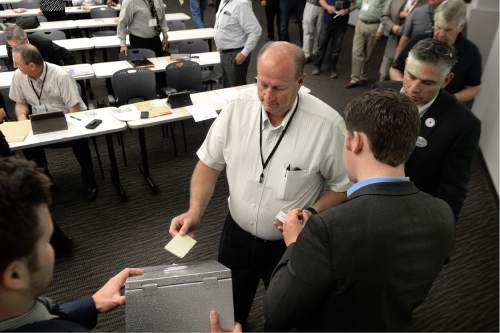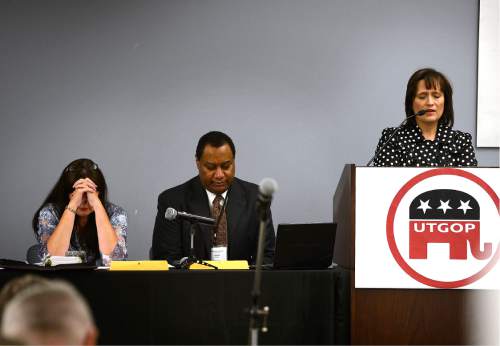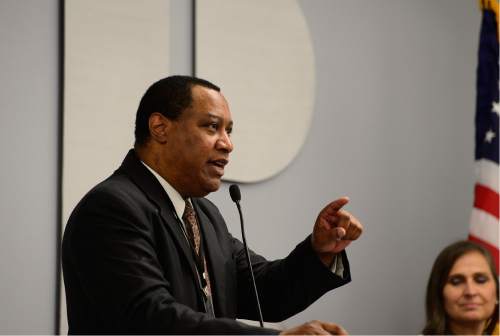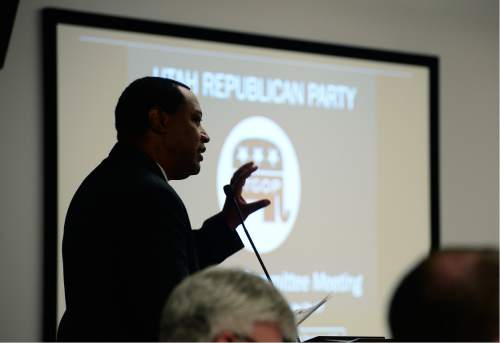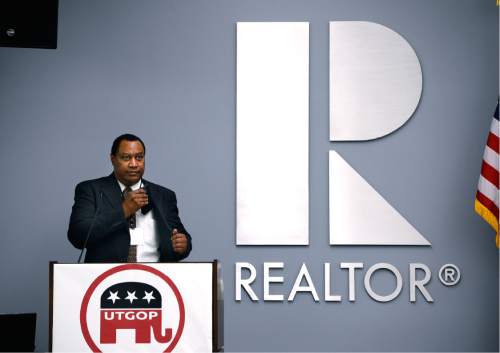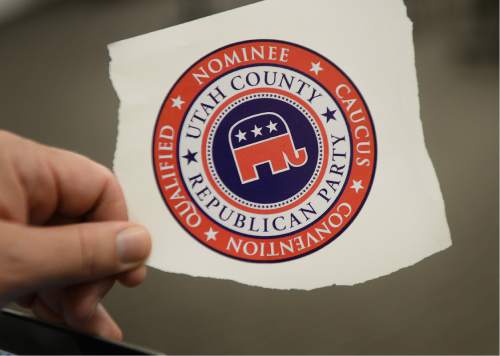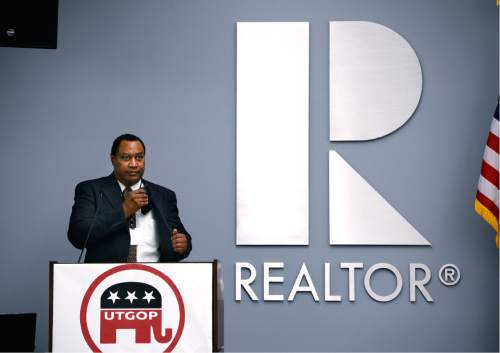This is an archived article that was published on sltrib.com in 2016, and information in the article may be outdated. It is provided only for personal research purposes and may not be reprinted.
Sandy • Utah Republicans are launching an unusual strategy for a decidedly unusual presidential election — a contest the party chairman says has become a choice of "Who do you hate the least?"
So the party is skipping Plan A, Plan B and has gone straight to "Plan T."
Instead of promoting presumptive presidential nominee Donald Trump, state GOP leaders said Saturday they will seek to persuade Utah Republicans who hate him not to skip voting — so they don't hurt local candidates who still need their help.
The message will be: "Don't sacrifice Utah Republicans because of Washington, D.C.," Utah Republican Party Chairman James Evans told central committee members Saturday.
Does the "T" in "Plan T" stand for Trump? "It may or may not be a coincidence," Evans said.
Saying the top-of-the-ticket race has become a contest of "who do you hate the least," he acknowledged that many Republicans may not vote at all because they despise Trump, who won 14 percent of the votes in Utah's presidential caucus.
"The option of staying home just simply can't be an option, because it will affect [races] down ticket, especially in Salt Lake County," he said.
Evans noted that Salt Lake County is the most competitive in the state, where Rep. Mia Love, R-Utah, won a tight race two years ago — and three legislative races were close enough that Democrats appeared to win on election night, only to see a trio of Republicans victorious once all the ballots were counted.
"Plan T is specifically for that, to make sure that we remind Republican voters that there is a U.S. Senate race, a gubernatorial race, congressional races" and more, he said. "Our approach has to be more local, kind of a 'What's in it for me?' "
In the presidential race, "If they want to write in Mickey Mouse, I'll take that as long as they vote" in other state and local races. "They can't let their disappointment overshadow the rest of the ballot."
Evans told leaders he hopes Trump can remake himself into a candidate more palatable in Utah, but "that is his job." And "Hillary [Clinton] has given us so much material" to attack, he said. "I think we'll be OK."
Enid Mickelsen, a former member of Congress who is the Utah GOP's national committeewoman, said, "Neither Hillary Clinton nor Donald Trump are going to be people that we point our children toward and say, 'I want you to be just like them when you grow up.' That's not the case in this race, and that's a shame."
She added, "What we're left with is deciding how we're going to vote on policy. Who is going to choose who is on the Supreme Court? Who is going to oppose or work with a Republican majority in the House and Senate?"
Mickelsen said, "That's not the kind of thing that people write brilliant march songs for. It's not the kind of headline that you get lots of people out to rallies for. But it's where we are."
While Utah GOP leaders are not thrilled that Trump won their party's national selection process, the central committee voted to continue fighting to overturn Utah's own newly reformed nomination system and return to the old system.
SB54 allows candidates to skip the traditional caucus-convention path to nomination and qualify for a primary by gathering signatures — giving the party less control over potential nominees.
In a three-hour, closed-door portion of the central committee session Saturday, members discussed "a variety of legal and political options" to attack SB54 and candidates who support it, Evans said.
That includes voting to explore appealing rulings against the party's court challenges to SB54, including the legal costs. Evans said the central committee will hear a report on those in late August or early September before deciding whether to file an appeal.
The central committee also passed a resolution once again urging the Republican-controlled Legislature to repeal SB54, denouncing it as an unconstitutional intrusion into the party's ability to control its affairs. SB54 was a legislative compromise that headed off a ballot initiative to wipe out the caucus-convention system. The law allows a candidate to choose to gather signatures, go through a convention or both.
Evans said county parties have decided to give their share of money from taxpayers who choose to have $1 donated to them on income tax forms to go toward the efforts to fight SB54, and the state party will also start a new fundraising effort for that. It passed around a bucket for the cause Saturday and collected $749.
Evans declined to discuss other options the party is considering against SB54 and its supporters.
But the state party did not opt to work against candidates who failed to qualify at conventions this year and used signature gathering to appear on the primary ballot.
County GOP parties in Salt Lake, Utah and Davis counties have taken sides to support convention-backed candidates before the primary, breaking from longstanding tradition. But Evans said rules requiring state party neutrality for the June 28 runoff long have been set, and the state party won't change them now.
The party did require six people who ran Saturday to fill a vacancy for state party secretary to declare their position on SB54. Randy O'Hara was the only one who did not affirmatively oppose SB54, saying it "didn't matter" for the position of secretary. He lost in the first round of voting.
Jonathan Johnson, who is challenging Gov. Gary Herbert in the GOP primary, received long applause from the central committee when he vowed to help repeal SB54. Herbert signed SB54, but he later said he wished he had not because of confusion and challenges it caused.


